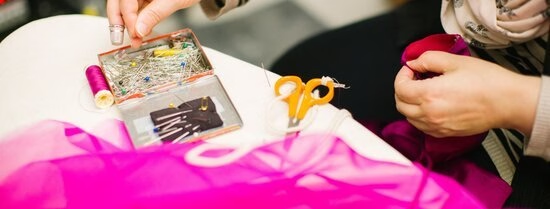Once upon a time, learning how to repair broken items was considered a necessary survival skill. The project transformative repair is aimed at restoring the cultural significance of mending, in order to promote the transition to a sustainable culture of repair.
What do we study?
Visible mending is loaded with cultural and social significance: in the past, mending circles were places where (mostly) women shared technical skills as well as social knowledge. More recently, feminist and queer craft circles have become spaces where textile repair and social resilience are created in tandem.
In the project “transformative repair”, we explore visible mending as embodied and affective research and pedagogical practice of thinking-together with objects. To this end, we tap into the potential of visible mending:
as concrete practices of repair that promote and develop valuable techniques for mending broken objects in such a way that the repair itself becomes part of the design of the object
as a metaphor for a reparative ethos, a “mending mindset”, that valorizes and normalizes mending and repair over renovation, recycling, and ultimately disposal
How do we study?
The research design operationalizes transformative repair as transdisciplinary and collaborative research-creation practice. As a hybrid form of artistic practice and postdisciplinary research, visible mending frames the process through which possibilities for pedagogical, institutional, and social transformation emerge. More concretely, sub-projects engage with real-world, local challenges where a “mending mindset” together with aesthetic cues from visible mending form the starting point for designing reparative interventions in the short term.
In collaboration with practitioners of textile arts and design, we develop workshops and mending circles and integrate these into various pedagogical, institutional, and community settings. These workshops concretely offer participants a new set of skills and tools for practical repairs, while simultaneously generating input for the theoretical, empirical and speculative research into the transformative potential of visible mending within the larger project of systemic transitions.
About the researcher
Sanne Koevoets researches feminised, and therefore often undervalued, marginalised and invisible professions and practices. As a researcher at Erasmus University Rotterdam's Platform for Design, Impact and Transition (DIT), she focuses on repair, restoration and mending as a concept, practice, and ethos for a planet in crisis. Sanne teaches Intersectional Media and Cultural Studies at Erasmus University College.
Work with us
You can contribute to the project in the following ways:
Participate in the mending workshops offered by DIT or our partners
Share your skills and knowledge of mending techniques with the project lead, and become a co-organizer of mending workshops
Get in touch to organize a mending workshop for one of your courses, projects, or events
Please reach out to Sanne at koevoets@euc.eur.nl
